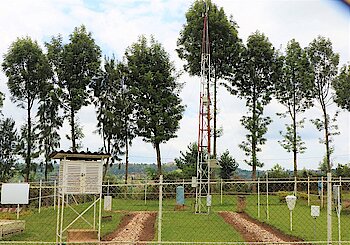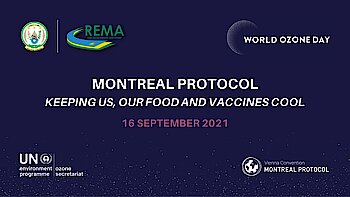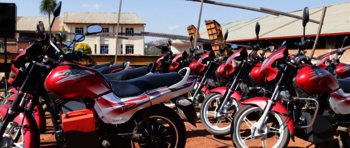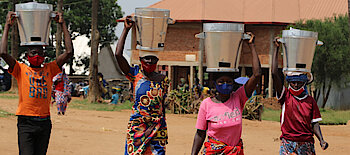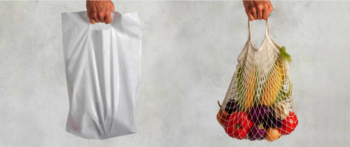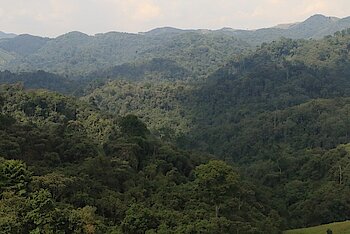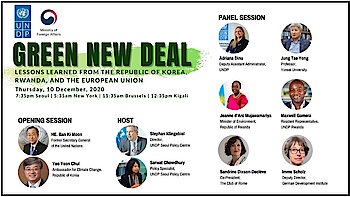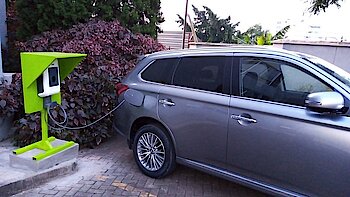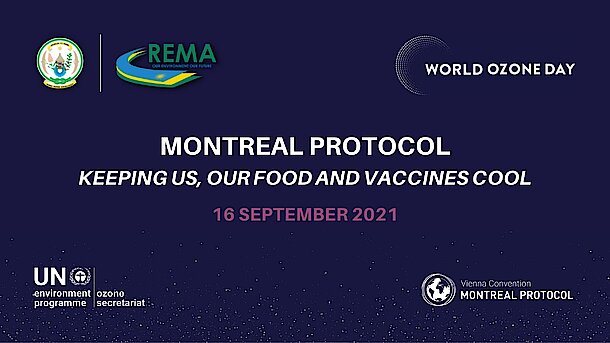
Rwanda celebrates World Ozone Day
Kigali, 16 September, 2021 - Today, Rwanda joins the rest of the world to mark the International Day for the preservation of the Ozone Layer. World Ozone Day raises awareness about the importance of the ozone layer and how we can all protect it. This year, the day is being celebrated under the theme: “Montreal Protocol - Keeping us, our food and vaccines cool.”
The Montreal Protocol started life as a global agreement to protect the ozone layer, a job it has done well, making it one of the most successful environmental agreements to date. The hole in the ozone layer is healing, in turn protecting human health, economies and ecosystems. Rwanda and all countries around the world joined forces in this effort and today around 99% of ozone depleting substances have been phased out.
This year’s World Ozone Day highlights that the Montreal Protocol, through the Kigali Amendment, is now helping to slow climate change and boost energy efficiency in the cooling sector, which contributes to food security and effective vaccine delivery.
“Rwanda is proud to play a part in the ongoing success of the Montreal Protocol. To implement the Kigali Amendment, Rwanda created a ground-breaking National Cooling Strategy in 2019. The strategy is ensuring the country’s air conditioning and refrigeration systems are cooling our food and vaccines without contributing to the climate crisis,” said Juliet Kabera, Director General, Rwanda Environment Management Authority.
The effects of damage to the ozone layer on people include skin cancer, increased risk of cataracts, weakened immune systems, DNA damage as well as lung disease. Depletion of the ozone layer can also lead to food shortages as ultraviolet radiation from the sun disturbs developmental and physiological processes and decreases the productivity of crops.
The success of the Montreal Protocol, and the ratification of the Kigali Amendment by 125 nations to date, signals the strong global commitment to protecting the ozone layer and phasing out dangerous gases that are warming our planet.
Rwandans and business owners are encouraged to purchase Kigali Amendment friendly air conditioners, refrigerators and other cooling systems that are energy efficient and do not contain chemical products that are harmful to our environment and to us.
Rwanda will mark the fifth anniversary of the Kigali Amendment to the Montreal Protocol on 15 October 2021.
About the Montreal Protocol
The Montreal Protocol on Substances that Deplete the Ozone Layer is an international treaty designed to reduce the production and consumption of ozone depleting substances (ODSs) in order to reduce their abundance in the atmosphere, and thereby protect the earth’s fragile ozone Layer. The Montreal Protocol was agreed on 16 September 1987 and entered into force on 1 January 1989. The Protocol, now ratified by 198 parties, establishes legally binding controls on national production and consumption of ODSs. Production and consumption of all principal ODSs by developed and developing nations will be almost completely phased out by 2030. The Montreal Protocol was amended in 2016 to phase down hydrofluorocarbons (HFCs).
Rwanda ratified the Montreal Protocol in 2003 and the Kigali Amendment in 2017. Since then, a number of different activities have been implemented all in line with contributing to the noble cause of protecting life on earth through preventing use of ozone depleting substances.
Rwanda’s Ozone Layer Protection Achievement
- Rwanda ratified the Vienna Convention to protect the Ozone Layer and the Montreal Protocol in 2003, and has since taken bold action to implement it.
- In line with implementing the Montreal Protocol, Rwanda achieved zero use of chlorofluorocarbons and equipment that relies on such products in 2010.
- Rwanda’s outstanding contribution to the preservation of the Ozone Layer earned the country the UNEP 2012 Ozone Protection Award.
- Rwanda has completed the first stage of its HCFC Phase-out Management Plan. The country met the 2013 freeze deadline and the 2015 10% HCFC reduction. In 2020, Rwanda consumed 1.71 tons of ODP HCFCs - approximately a 65% reduction from the baseline, which exceeds the 2020 target of 35% reduction in HCFC consumption.
- An online system for permitting the import and export of new, used, recycled, and reclaimed controlled substances and related equipment has been established here.
- Rwanda has trained refrigeration technicians across the country on the safe use of flammable refrigerants such as hydrocarbons, trained customs officers on controlling and monitoring ODS trade, and demonstrated conversions from HCFCs to HC refrigerants.
- Rwanda developed a National Cooling Strategy that promotes energy efficient appliances that comply with Minimum Energy Performance Standards and the Kigali Amendment.
- In 2021, Rwanda received the Lifetime Commitment to Cooling Award from the Clean Cooling Collaborative.
For further information, visit ozone.unep.org and www.rema.gov.rw
Topics
More posts
How Rwanda is using climate change data and projections to plan for the future
In 2011, Rwanda adopted a Green Growth and Climate Resilience Strategy to become a developed, climate-resilient, and low-carbon economy by 2050. To…
Rwanda celebrates World Ozone Day
Kigali, 16 September, 2021 - Today, Rwanda joins the rest of the world to mark the International Day for the preservation of the Ozone Layer. World…
Retrofit Electric Motorcycles Project; Another step towards emission reduction
The Greenhouse gases emission inventory report of 2015 indicated that the vehicles (that burns the fossil fuel) emit emissions at 13% of the total…
What you should know about Climate Adaptation Summit 2021 that is taking place online
Even though, the climate change is increasingly distressing, fortunately, there are many actions we can do to ensure our future is as prosperous as…
Beneficiaries of REMA’s Green Amayaga Project receive improved cookstoves to promote energy efficiency
Rwanda Environment Management Authority through the Forest Landscape Restoration in the Amayaga Region (Green Amayaga) Project is distributing…
Develop business and deliver green growth solutions
The economic development is a concern for every country around the World and everyone is concerned with personnel development. However, it is no…
From ambition to action: Rwanda’s climate resilience plan
On Saturday, December 12, 2020, global leaders are meeting to discuss a problem on many of our minds: climate change. The extraordinary virtual…
Green New Deal: Lesson Learned from the Republic of Korea, Rwanda and the European Union
This webinar was co-organized by the Korea Ministry of Foreign Affairs and the UNDP Seoul Policy Centre (USPC). It is the second event on the theme of…
REMA get the Electric Vehicle to support Rwanda's environmental protection efforts
The Rwanda Environment Management Authority (REMA) has taken delivery of its first ever electric vehicle that will be used to support the…
